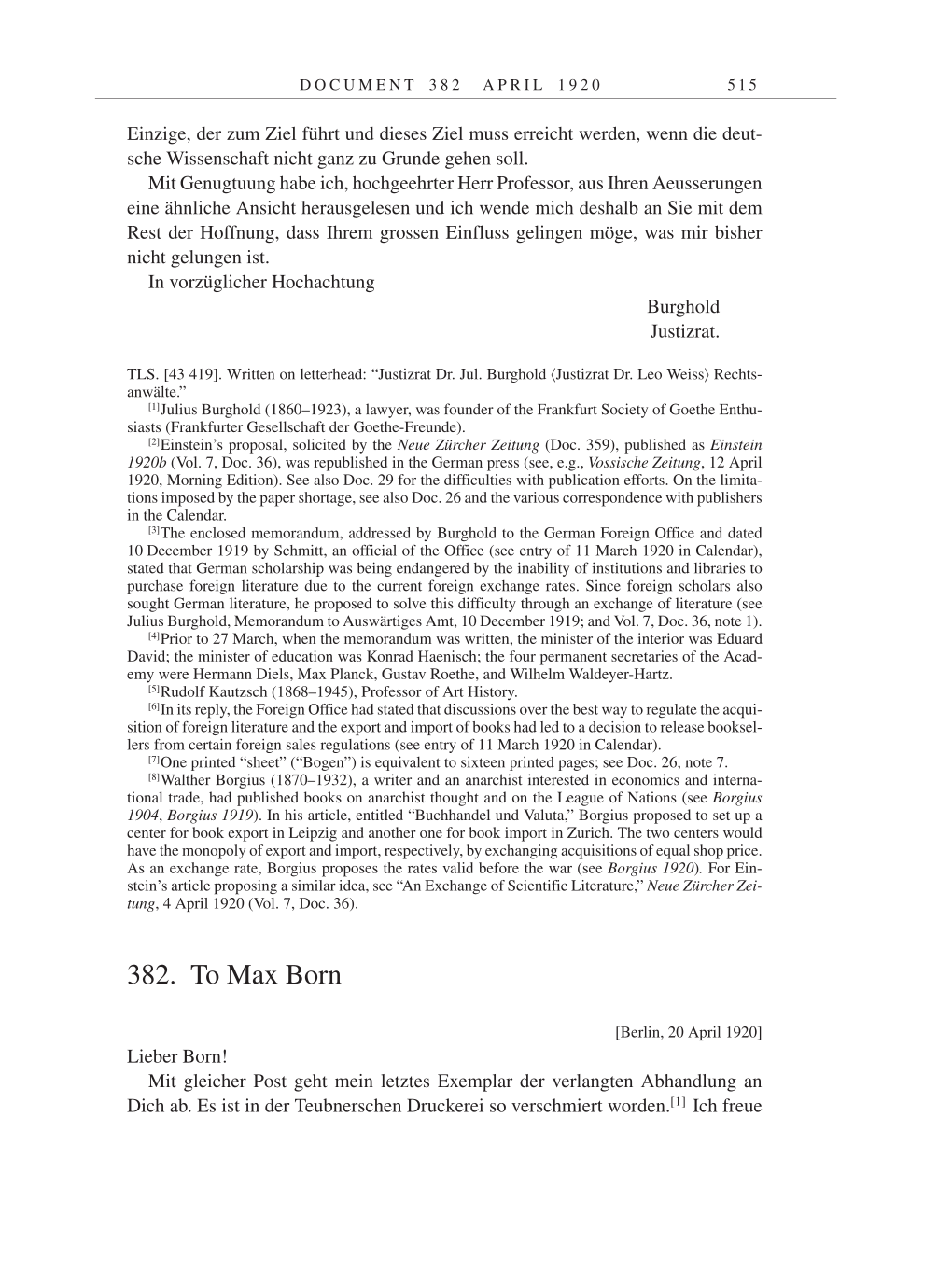D O C U M E N T 3 8 2 A P R I L 1 9 2 0 5 1 5
Einzige, der zum Ziel führt und dieses Ziel muss erreicht werden, wenn die deut-
sche Wissenschaft nicht ganz zu Grunde gehen soll.
Mit Genugtuung habe ich, hochgeehrter Herr Professor, aus Ihren Aeusserungen
eine ähnliche Ansicht herausgelesen und ich wende mich deshalb an Sie mit dem
Rest der Hoffnung, dass Ihrem grossen Einfluss gelingen möge, was mir bisher
nicht gelungen ist.
In vorzüglicher Hochachtung
Burghold
Justizrat.
TLS. [43 419]. Written on letterhead: “Justizrat Dr. Jul. Burghold 〈Justizrat Dr. Leo Weiss〉 Rechts-
anwälte.”
[1]Julius Burghold (1860–1923), a lawyer, was founder of the Frankfurt Society of Goethe Enthu-
siasts (Frankfurter Gesellschaft der Goethe-Freunde).
[2]Einstein’s proposal, solicited by the Neue Zürcher Zeitung (Doc. 359), published as Einstein
1920b (Vol. 7, Doc. 36), was republished in the German press (see, e.g., Vossische Zeitung, 12 April
1920, Morning Edition). See also Doc. 29 for the difficulties with publication efforts. On the limita-
tions imposed by the paper shortage, see also Doc. 26 and the various correspondence with publishers
in the Calendar.
[3]The enclosed memorandum, addressed by Burghold to the German Foreign Office and dated
10 December 1919 by Schmitt, an official of the Office (see entry of 11 March 1920 in Calendar),
stated that German scholarship was being endangered by the inability of institutions and libraries to
purchase foreign literature due to the current foreign exchange rates. Since foreign scholars also
sought German literature, he proposed to solve this difficulty through an exchange of literature (see
Julius Burghold, Memorandum to Auswärtiges Amt, 10 December 1919; and Vol. 7, Doc. 36, note 1).
[4]Prior to 27 March, when the memorandum was written, the minister of the interior was Eduard
David; the minister of education was Konrad Haenisch; the four permanent secretaries of the Acad-
emy were Hermann Diels, Max Planck, Gustav Roethe, and Wilhelm Waldeyer-Hartz.
[5]Rudolf Kautzsch (1868–1945), Professor of Art History.
[6]In its reply, the Foreign Office had stated that discussions over the best way to regulate the acqui-
sition of foreign literature and the export and import of books had led to a decision to release booksel-
lers from certain foreign sales regulations (see entry of 11 March 1920 in Calendar).
[7]One printed “sheet” (“Bogen”) is equivalent to sixteen printed pages; see Doc. 26, note 7.
[8]Walther Borgius (1870–1932), a writer and an anarchist interested in economics and interna-
tional trade, had published books on anarchist thought and on the League of Nations (see Borgius
1904, Borgius 1919). In his article, entitled “Buchhandel und Valuta,” Borgius proposed to set up a
center for book export in Leipzig and another one for book import in Zurich. The two centers would
have the monopoly of export and import, respectively, by exchanging acquisitions of equal shop price.
As an exchange rate, Borgius proposes the rates valid before the war (see Borgius 1920). For Ein-
stein’s article proposing a similar idea, see “An Exchange of Scientific Literature,” Neue Zürcher Zei-
tung, 4 April 1920 (Vol. 7, Doc. 36).
382. To Max Born
[Berlin, 20 April 1920]
Lieber Born!
Mit gleicher Post geht mein letztes Exemplar der verlangten Abhandlung an
Dich ab. Es ist in der Teubnerschen Druckerei so verschmiert
worden.[1]
Ich freue
